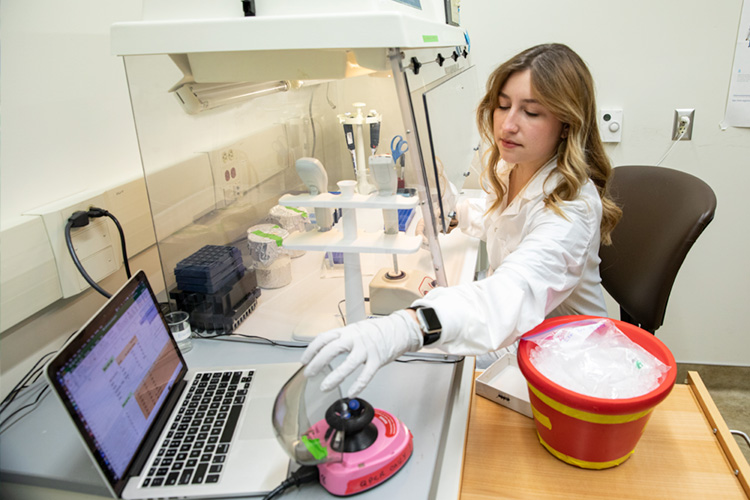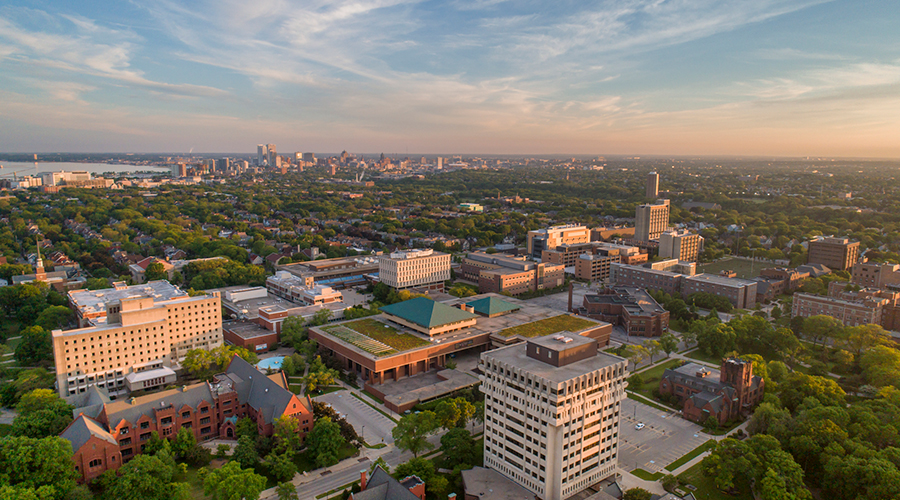Freshwater Sciences, MS: Aquatic Science (Thesis) MS
Are you interested in the ecology, health implications, economics and politics of water? Ready to be part of the next generation of water scientists and policymakers? Explore a freshwater sciences master’s degree.
The thesis track in the Master of Aquatic Science offers an interdisciplinary, research-based program to prepare you for a career in research and industry, or to further your studies in a PhD program. Thesis track students work closely with faculty and scientists to conduct original research, develop new technologies, inform water policy, and advance our understandings of complex freshwater systems and issues.
Schedule a Graduate Program Information Session
Program Type
Master’s
Program Format
On Campus
Strong Research. Freshwater Solutions.
Graduate students in the thesis freshwater sciences master’s degree program work in one of the research labs at the Great Lakes Research Facility. A faculty advisor will help you choose your thesis topic and guide you as you develop research skills.
What you learn will prepare you to solve scientific problems, inform policy, improve water management, and promote the health and sustainability of freshwater systems worldwide.

Turn science into action with a freshwater sciences master’s degree.
While earning your graduate degree, you will
- Explore natural and human-created freshwater systems.
- Learn from world-class faculty within a small-class environment.
- Build a multidisciplinary science foundation.
- Develop in-demand technical and professional skills.
- Gain research experience working in a scientific lab.
Students in the MS thesis program must be accepted by a faculty member who will serve as the major professor and be primarily responsible for matriculation.
The School of Freshwater Sciences admits new thesis students for fall and spring semesters.
- Fall applications are due January 31
- Spring applications are due October 1
You must meet Graduate School requirements in addition to the following to be considered for admission:
A bachelor’s degree in biology, chemistry, economics, geosciences, mathematics, physics, public policy, or other appropriate natural science, social science or engineering discipline.
Applicant must have at least a 3.0 undergraduate GPA. All of an applicant’s undergraduate coursework completed before award of the first undergraduate degree is included in the GPA computation. For courses that were repeated for credit, each attempt is included.
Those whose undergraduate GPA is below 3.0 should contact Aaron Thiel, Graduate Program Manager, for guidance. Applicants may be considered for admission if they are able to provide evidence of their ability to succeed in graduate study.
All applicants, including UWM students, must upload an official or unofficial transcript into the Panthera admission application system for all work done at higher education/postsecondary institutions. All applicants who are admitted to the Graduate School will be required to submit an official transcript with the degree posted within two weeks of the beginning of their first semester of enrollment.
The reason statement is an essential part of the application. It is used to determine the appropriateness of your educational and professional goals and serves as an example of your ability to express yourself in writing. Your reason statement should include:
- your reasons for pursuing graduate study
- your specific background interests and background in the field
- any relevant skills or training you’ve acquired
- any academic awards or honors you have received
Submit a current resume that clearly articulates your professional experience.
Submit a scholarly writing sample that demonstrates critical thinking and writing skills.
Three letters of recommendation are required by persons who can attest to your scholarship and/or research potential and your success in graduate school at the School of Freshwater Sciences.
List relevant courses taken at previous institutions. Please include course number, course title, credits and final grade (example: BioSci 150, Foundations of Biological Sciences, 4 credit, A-). The following prerequisites are strongly recommended:
- at least one semester of any three of the following topical areas: chemistry, biological sciences, physics and calculus
- one additional semester of chemistry, biological sciences or physics
GRE scores are not required, but are strongly recommended.
Minimum degree requirement is 31 graduate credits.
| Code | Title | Credits |
|---|---|---|
| Choose three of the following: | 9 | |
| FRSHWTR 502 | Aquatic Ecosystem Dynamics | |
| FRSHWTR 504 | Quantitative Freshwater Analysis | |
| FRSHWTR 506 | Environmental Health of Freshwater Ecosystems | |
| FRSHWTR 510 | Economics, Policy and Management of Water | |
| Choose one of the following: | 3 | |
| FRSHWTR 513 | Field Experimentation and Analysis in Freshwater Sciences | |
| FRSHWTR 514 | Analytical Techniques in Freshwater Sciences | |
| Required courses | ||
| FRSHWTR 890 | Science Communication | 3 |
| FRSHWTR 900 | Colloquium in Freshwater Sciences | 1 |
| Electives | ||
| Select 9 credits in consultation with the students major advisor | 9 | |
| Master’s Research and Thesis Credits | ||
| FRSHWTR 985 | Master’s Research and Thesis (Up to 6 credits) | 6 |
| Total Credits | 31 | |
Freshwater sciences master’s thesis students are typically funded through faculty research projects. We strongly recommend you reach out to faculty members whose interests align with your own to discuss potential research and funding opportunities. Current research assistantship opportunities.
The School of Freshwater Sciences also offers competitive assistantships and scholarships. For more information about other financial aid options, please visit UWM Financial Aid.
Graduates of our MS thesis programs have high placement rates. More than 89% went into a water-related job 11% enrolled in a PhD program.

